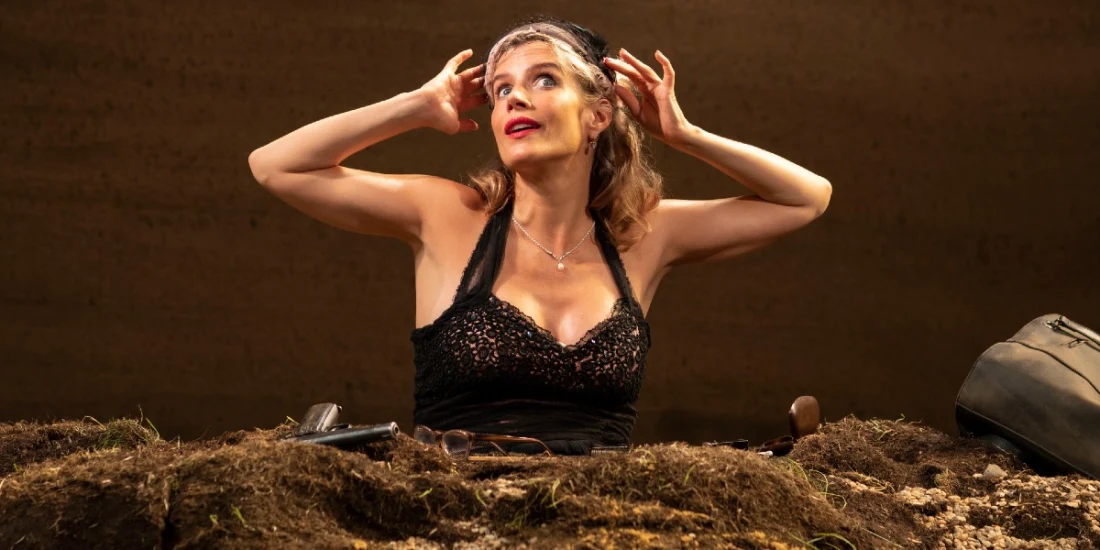Lisa Dwan shines in Trevor Nunn's powerful and urgent production of 'Happy Days'
"Another heavenly day," trills Winnie, the inexhaustibly chatty - not to mention seemingly inexhaustible - heroine of Beckett's Happy Days, which is marking its 60th birthday this year with a heavenly Riverside Studios revival from the director Trevor Nunn. Perhaps it takes the wisdom accrued over a life to bring to this Irishman's seminal two-hander the forcefulness and clarity imparted here by Nunn, who is himself an indefatigable 81.
Whatever the reason, this is the most powerful Happy Days I've experienced in multiple encounters with this play, dating back to the great Irene Worth at New York's Public Theater back in the day. Inheriting a role often characterised as the female Hamlet, a never-more-luminous Lisa Dwan finds a gathering mournfulness to Winnie, all the while accommodating the character's garrulousness and good cheer, as well. Abetted by a peerless design team that allows for the cinematic reach of Robert Jones's Georgia O'Keeffe-style set and some painterly lighting from Tim Mitchell, Beckett's scorched-earth landscape acquires a scorching potency anew: how one would love to have been able to momentarily cast aside our facemasks at the finish and shout "bravo."
At the outset, you clock the fusspot in Winnie, alongside the self-dramatist who finds ceaseless theatricality in the quotidian in an effort, presumably, to get her through the day, happy or otherwise. Buried in the first act up to her waist in earth, Winnie rummages through her bag producing various items including "Brownie," her gun, this play's equivalent to the talk of hanging by a rope in Waiting for Godot. Acknowledging "earth, you old extinguisher," Winnie tosses questions aplenty into the air, pondering her own beauty and whether she has "put on flesh." (She cleans her glasses with the obsessiveness of someone beset by OCD.)
That last musing acquires a special resonance in a staging, twice-delayed, that has finally happened at the same time as Dwan is herself six months pregnant with a baby girl (no news yet as to whether the infant will be called Winnie). That circumstance lends extra-theatrical piquancy to a play defined by entrapment as performed by the leading Beckett interpreter of her generation at the very moment that she is herself bursting with life. And Dwan, following on from solo Beckett evenings at the Royal Court and the Old Vic, amongst other venues, is even more fearless here, finding a performative quality to Winnie's first-act posturing that deepens after the interval in an unexpected, and thrilling way. (Her voice hints at social pretensions to Winnie that fold class into the limitless thematic reach of the text.)
Come the second act, we find Winnie's hair no longer done up but instead falling lank by a face lit so as to assume an appropriately deathly pallor. Buried at this point up to a neck that, we are told, is hurting, Winnie carries on, provocatively questioning whether she is wearing anything underneath in much the way, these days, that people of late have boasted of fielding Zoom calls in their underwear. Indeed, it's not much of a stretch to feel as if the pandemic has only amplified the import of a play at a time when isolation has made de facto Winnies out of so many, their inner chatter presumably both a solace and a scourge.
Winnie, of course, doesn't exist alone but has a companion in the largely mute Willie (Simon Wolfe, excellent), a former paramour of questionable hygiene (he is described eating his snot) who seems to exist in all manner of ways just beyond Winnie's reach. There's a startling moment near the end where the two lock eyes and fall into silence, even as the bells that pierce the air throughout come to seem both more frequent and more alarmist. Has this Winnie already begun to taste the mortality that her conversation wants to stave off, or is it just that a psyche given over to "confused cries" simply cannot come to rest? However one interprets the specifics of this interpretation, Nunn's revelatory production locates not just the self-evident irony of the title but something more ineffable along with it. Beckett's play comes infused with what Winnie calls the "breath of life" only to lead us head-on to that mysterious and forbidding portal that opens on to death.
Photo credit: Lisa Dwan in Happy Days (Photo by Helen Maybanks)
Originally published on
